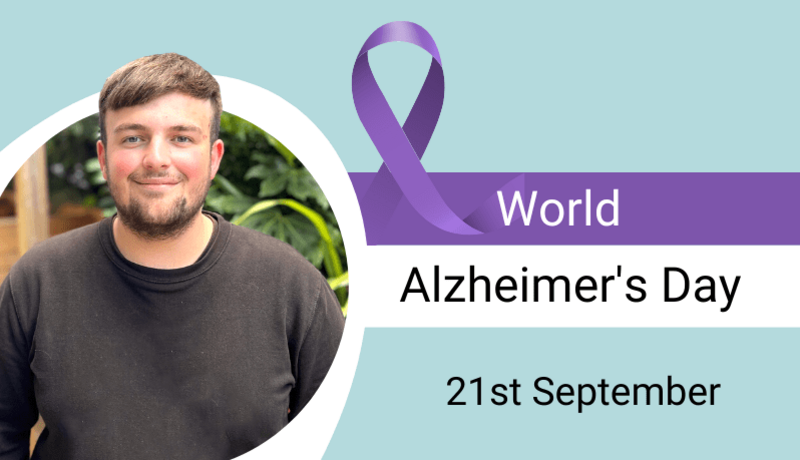Personal Perspective | World Alzheimer's Day with Tom Terry
Posted on September 2022

The theme for this year’s World Alzheimer’s Day is Know Dementia, Know Alzheimer’s, with a focus on post-diagnosis support. Alzheimer’s Society predicts that over 1 million people in the UK will be living with dementia by 2025, affecting not only those living with the condition, but also their families, friends and carers.
We heard from Tom Terry, Finance & Education Consultant, about his family’s experience caring for his nan after she was diagnosed with dementia.
My nan was always a switched-on lady, intelligent. I was pretty young when I first noticed she wasn’t her usual self. She would often pick me up from school and give me a hand with my homework, and one day I asked her to go through the alphabet with me. I remember writing it down, looking at it and thinking: that’s not even remotely right. When I told my dad about it, he said she hadn’t been very well lately. As a young kid I never delved into it too much, but from then on it was a downwards slope.
Around when I started secondary school she couldn’t live on her own anymore, and my parents sold her house so she could live with us. She became quite irritable because a lot of the time she’d forget where she was. Nan would frequently ask to go to her mum’s house as she believed she lived just down the road, even though she’d died around fifty years ago.
It could be very frustrating. As a kid I would come home from school and want to relax, but I’d end up having the same conversation every ten minutes. I saw her as almost a different person to who she was before. It was like she was there, but not really there. My nan had raised my dad on her own since he was sixteen, whereas now the roles were reversed; she was vulnerable and he had to look after her.
Her general health had deteriorated alongside the dementia, so she required a lot of care. She wouldn’t be able to do the simplest things like go to the toilet, wash, or cook food. We would have to give her constant encouragement to eat otherwise she would have literally wasted away; it’s not that she didn’t want to, but she thought she’d just eaten a few minutes before, even though she hadn’t.
It was an emotionally and physically draining time for my parents, as they were both working and then had to come home to another full-time job. In the end they reached out to get support from Helping Hands; they’re a great home-care organisation. They had people coming over several times a day to prepare food and just sit and chat with my nan. My mum still meets up for lunch with them every now and then, for her it’s someone she can relate to, as they understood the weight of the situation in a way her friends found difficult to grasp.
Looking back, I wish I’d been more patient, as at the end of the day you have to remember that they’re still someone that you love and care for. As a young kid this was difficult to get my head around and recognise it wasn’t my nan’s fault. I didn’t really speak about it with my parents at the time because you almost feel guilty for the way you’re feeling. It’s good to remain as patient as you can, but when you do get frustrated, it’s important not to feel bad about it, as it’s a natural reaction to the situation.
It’s also crucial to talk about it, I can’t imagine how my nan felt through it all, and as much as those suffering from dementia need support, so do their carers. It can be very exhausting, and you’ve got to be very mentally tough to look after someone; being able to share that with another person and have someone to lean on is a great release.
If you are currently affected by a diagnosis of dementia, you can find helpful resources and support at Alzheimer's Society.
Recent Articles
-
Flipping the Script on Islamophobia | Personal perspective | Nadia Muzaffar
Conversation is a powerful tool. Even a two-minute chat can change a perception, correct a misco...
about 1 month ago -
Pancreatic Cancer Awareness Month | Personal Perspective | Louise Francis
This year, our Birmingham office chose to fundraise for Pancreatic Cancer UK in support of my br...
about 1 month ago -
Personal Perspective| Islamophobia Awareness Month with Safiyyah Ayaz
For Islamophobia Awareness Month, we are honoured to feature passionate employees who have chosen...
about 2 months ago